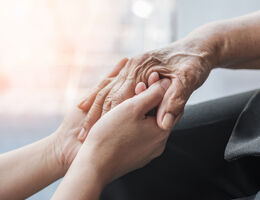
April 11, 2024—You likely know someone living with Parkinson's disease. It's the second most common neurodegenerative disorder in the United States, following Alzheimer's disease, according to the National Institute of Neurological Disorders and Stroke.
Parkinson's is a neurological condition that gets worse over time. Early symptoms can be subtle—but it's important to recognize them early. Early treatment can offer relief from symptoms and may slow the progression of the disease.
It's especially important to know the signs of Parkinson's if you're at increased risk for the condition. That includes:
- People age 60 or older.
- People with a family history of Parkinson's disease.
- People who have been exposed to certain pesticides.
While anyone can develop the condition, Parkinson's is more common in men than in women.
Early signs of Parkinson's
Parkinson's disease doesn't start the same way for everyone. It can progress at different rates, and a person with Parkinson's might not have all of the common symptoms. Or they might have a symptom on just one side of the body. But in the early stages, people with Parkinson's often notice:
- Tremors. The hands or chin might shake slightly when at rest.
- Stiffness or lack of mobility. People with Parkinson's often move slowly. They might feel stiffness that doesn't go away with movement. This might include a sensation of being "stuck."
- Loss of smell. A person with Parkinson's might notice they can't smell foods or scented candles.
- Voice changes. People with Parkinson's often speak softly or sound hoarse.
- Shrinking handwriting. Someone with Parkinson's may begin to write smaller and leave smaller spaces between words.
- Constipation. If chronic constipation can't be explained by another cause, it can be a sign of Parkinson's.
- Facial masking. People with Parkinson's may not change their facial expression as much as they did before. They might seem to have a lack of facial expression or a serious, angry or sad expression that is unintended.
- Dizziness. Parkinson's can cause dizziness on standing, which can lead to fainting.
- Posture changes. Someone with Parkinson's may lean or slouch when standing. When walking, they might not move their arms as much as they used to.
- Movement during sleep. Thrashing around or acting out dreams can be a warning sign.
- Impaired balance. Parkinson's causes problems with balance and coordination—raising the risk of falling.
- Mood changes. Parkinson's can cause depression and other mood problems.
Keep in mind that many of these symptoms can be caused by other conditions. For example, loss of smell can be caused by a cold or by COVID-19. And constipation can have many causes.
No single symptom is a clear sign that someone has Parkinson's. But if you're experiencing more than one of the symptoms on the list, let your doctor know.
Test your knowledge
There are a lot of myths and misconceptions about Parkinson's. See how well you know the facts by taking this short quiz.
Sources
- National Institute of Neurological Disorders and Stroke. "Parkinson's Disease." https://www.ninds.nih.gov/health-information/disorders/parkinsons-disease.
- National Institute of Neurological Disorders and Stroke. "Parkinson's Disease: Challenges, Progress, and Promise." https://www.ninds.nih.gov/current-research/focus-disorders/parkinsons-disease-research/parkinsons-disease-challenges-progress-and-promise.
- National Institute on Aging. "Parkinson's Disease: Causes, Symptoms, and Treatments." https://www.nia.nih.gov/health/parkinsons-disease/parkinsons-disease-causes-symptoms-and-treatments.
- Parkinson's Foundation. "10 Early Signs." https://www.parkinson.org/understanding-parkinsons/10-early-signs.